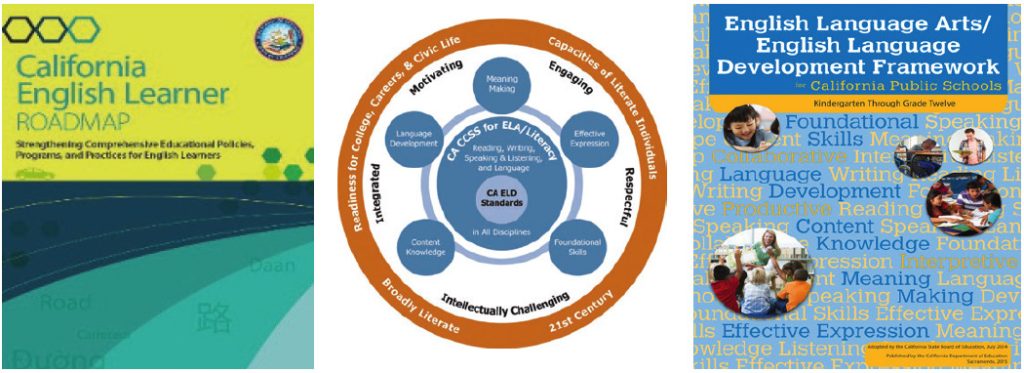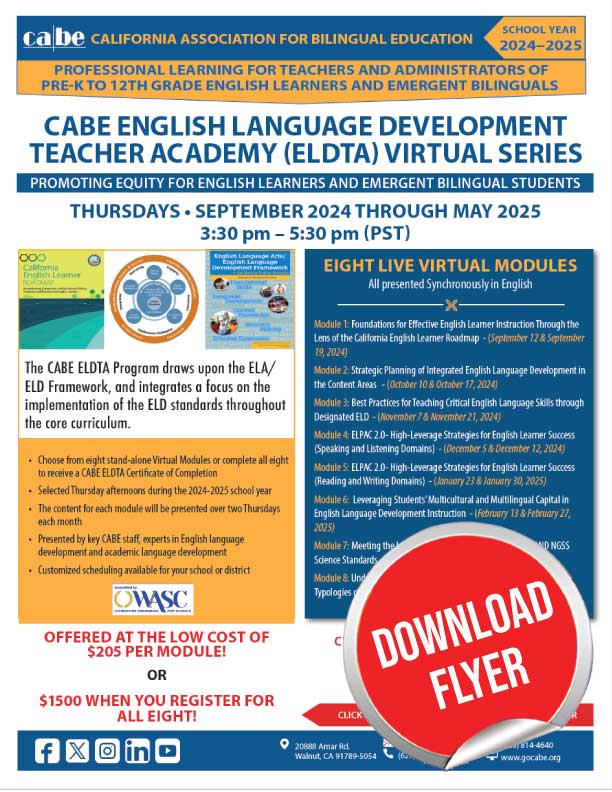
OUR PROGRAM OFFERS:
- Choose from eight stand-alone Virtual Modules or complete all eight to receive a CABE ELDTA Certificate of Completion.
- Selected Thursday afternoons during the 2023-24 school year.
- The content for each Module will take place over two Thursday afternoon sessions.
- Presented by key CABE staff, experts in English language development and academic language development.
- Customized scheduling available for your school or district.

EIGHT LIVE VIRTUAL MODULES
All presented synchronously in English
September 12 & 19, 2024 • 3:30 pm – 5:30 pm (PST)
The California English Learner (EL) Roadmap, California’s new policy on educating the diverse population of students in our schools who are English Learners will be shared, and the shift from previous educational policy regarding ELs will be highlighted. Participants will explore the EL Roadmap Teacher Toolkits, which are designed to help teachers understand and reflect upon the new English Learner policy’s implementation in their classrooms.
October 10 & 17, 2024 • 3:30 pm – 5:30 pm (PST)
Participants will gain a deeper understanding of how Integrated English Language Development (ELD) supports higher levels of academic achievement and English language proficiency for English Learners. The English Language Arts (ELA)/English Language Development (ELD) Framework and English Language Development Standards will be reviewed. Critical components of Integrated ELD will be examined, through a sample science lesson.
November 7 & 21, 2024 • 3:30 pm – 5:30 pm (PST)
Participants will gain a deeper understanding of the essential components of Designated English Language Development (ELD) to ensure equity in education for English Learners. Sample lessons will be modeled as well as guidance on student grouping, lesson planning, and connections to the content areas will be shared
December 5 & 12, 2024 • 3:30 pm – 5:30 pm (PST)
Participants will examine the content of the English Language Proficiency Assessments for California (ELPAC) assessment and its connection to The English Language Development (ELD) Standards. The various tasks that make up the ELPAC will also be analyzed, with a focus on how to integrate similar tasks in instruction across the content areas. The ELPAC performance level descriptors (PLDs) will also be examined along with their connection to the English Language Development (ELD) proficiency levels.
January 23 & 30, 2025 • 3:30 pm – 5:30 pm (PST)
Participants will learn about the high-leverage instructional strategies that can help prepare English Learners for success on the ELPAC, which will be modeled throughout the session. One sample ELPAC task from the reading and writing domains will be shared
February 13 & 27, 2025 • 3:30 pm – 5:30 pm (PST)
Based on the principles of the EL Roadmap policy, schools must aim to create inclusive and inviting learning environments that reflect the diversity of the school community. The learning environment must reflect the languages and cultures of the community in order for students to develop a sense of belonging. Participants will explore strategies that can be implemented by multilingual and monolingual staff to create multilingual ecologies that foster and promote the use of home languages and contribute to students’ own sociocultural competence.
April 10 & 17, 2025 • 3:30 pm – 5:30 pm (PST)
Participants will interact with a CABE PDS consultant to learn how to differentiate their instruction through the provision of Integrated English Language Development (ELD) in order to promote engaging, active student participation. By using real content examples, teachers will be shown different ways to improve English literacy skills and build academic vocabulary by building upon student strengths and using grade-level concepts while also addressing the English Language Development (ELD) Standards, the Next Generation Science Standards (NGSS), the CCSS mathematics standards, and the Standards for Mathematical Practice.
May 1 & 8, 2025 • 3:30 pm – 5:30 pm (PST)
Participants will explore the various profiles and needs of Long-Term English Learners and Newcomer Students, including some of the areas of language development that are the most challenging for both groups. Evidence-based techniques and strategies that work with all students will be modeled. Programs for Newcomers at elementary, middle, and high school will be highlighted, along with resources such as the US Department of Education’s Newcomer Toolkit, and other state and district toolkits. A focus on meeting the socioemotional needs of diverse typologies of English learners will be highlighted.


